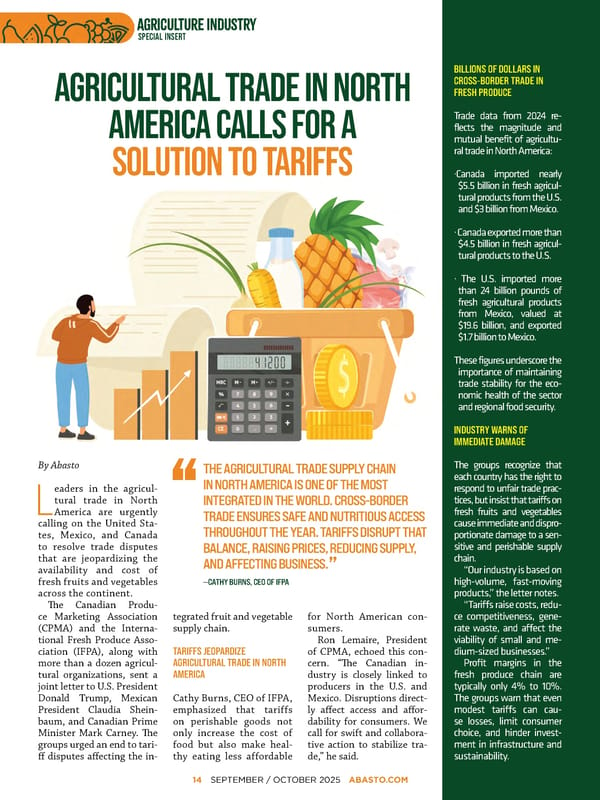14�SEPTEMBER / OCTOBER 2025�ABASTO.COM SPECIAL INSERT Agriculture industry AGRICULTURAL TRADE IN NORTH AMERICA CALLS FOR A SOLUTION TO TARIFFS By Abasto L eaders in the agricul- tural trade in North America are urgently calling on the United Sta- tes, Mexico, and Canada to resolve trade disputes that are jeopardizing the availability and cost of fresh fruits and vegetables across the continent. Te Canadian Produ- ce Marketing Association (CPMA) and the Interna- tional Fresh Produce Asso- ciation (IFPA), along with more than a dozen agricul- tural organizations, sent a joint letter to U.S. President Donald Trump, Mexican President Claudia Shein- baum, and Canadian Prime Minister Mark Carney. Te groups urged an end to tari- f disputes afecting the in- tegrated fruit and vegetable supply chain. TARIFFS JEOPARDIZE AGRICULTURAL TRADE IN NORTH AMERICA Cathy Burns, CEO of IFPA, emphasized that tariffs on perishable goods not only increase the cost of food but also make heal- thy eating less affordable for North American con- sumers. Ron Lemaire, President of CPMA, echoed this con- cern. “Te Canadian in- dustry is closely linked to producers in the U.S. and Mexico. Disruptions direct- ly afect access and afor- dability for consumers. We call for swift and collabora- tive action to stabilize tra- de,” he said. THE AGRICULTURAL TRADE SUPPLY CHAIN IN NORTH AMERICA IS ONE OF THE MOST INTEGRATED IN THE WORLD. CROSS-BORDER TRADE ENSURES SAFE AND NUTRITIOUS ACCESS THROUGHOUT THE YEAR. TARIFFS DISRUPT THAT BALANCE, RAISING PRICES, REDUCING SUPPLY, AND AFFECTING BUSINESS.” —CATHY BURNS, CEO OF IFPA BILLIONS OF DOLLARS IN CROSS-BORDER TRADE IN FRESH PRODUCE Trade data from 2024 re- flects the magnitude and mutual benefit of agricultu- ral trade in North America: ·Canada imported nearly $5.5 billion in fresh agricul- tural products from the U.S. and $3 billion from Mexico. · Canada exported more than $4.5 billion in fresh agricul- tural products to the U.S. · The U.S. imported more than 24 billion pounds of fresh agricultural products from Mexico, valued at $19.6 billion, and exported $1.7 billion to Mexico. These figures underscore the importance of maintaining trade stability for the eco- nomic health of the sector and regional food security. INDUSTRY WARNS OF IMMEDIATE DAMAGE The groups recognize that each country has the right to respond to unfair trade prac- tices, but insist that tariffs on fresh fruits and vegetables cause immediate and dispro- portionate damage to a sen- sitive and perishable supply chain. “Our industry is based on high-volume, fast-moving products,” the letter notes. “Tarifs raise costs, redu- ce competitiveness, gene- rate waste, and afect the viability of small and me- dium-sized businesses.” Profit margins in the fresh produce chain are typically only 4% to 10%. The groups warn that even modest tarifs can cau- se losses, limit consumer choice, and hinder invest- ment in infrastructure and sustainability.
 Abasto Magazine: September/October 2025 ENGLISH Page 63 Page 65
Abasto Magazine: September/October 2025 ENGLISH Page 63 Page 65